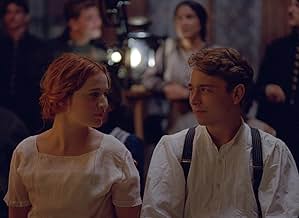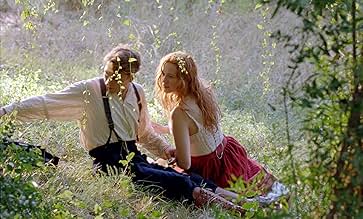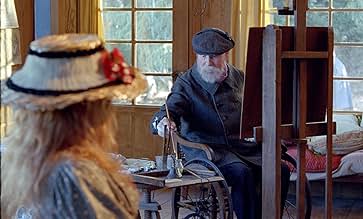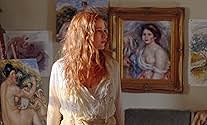Renoir
- 2012
- Tous publics
- 1h 51min
NOTE IMDb
6,5/10
6,1 k
MA NOTE
Installé sur la Côte d'Azur durant l'été 1915, Jean Renoir, fils du peintre impressionniste, rentre chez lui en convalescence auprès d'Andrée après avoir été blessé lors de la Première Guerr... Tout lireInstallé sur la Côte d'Azur durant l'été 1915, Jean Renoir, fils du peintre impressionniste, rentre chez lui en convalescence auprès d'Andrée après avoir été blessé lors de la Première Guerre mondiale.Installé sur la Côte d'Azur durant l'été 1915, Jean Renoir, fils du peintre impressionniste, rentre chez lui en convalescence auprès d'Andrée après avoir été blessé lors de la Première Guerre mondiale.
- Réalisation
- Scénario
- Casting principal
- Récompenses
- 3 victoires et 11 nominations au total
Anne-Lise Heimburger
- La boulangère
- (as Annelise Heimburger)
Thierry Hancisse
- Le brocanteur
- (as Thierry Hancisse de la Comédie Française)
Cécile de Moor
- Servante Collettes
- (as Cecile Rittweger)
Avis à la une
Renoir (2012)
So promising. And so beautiful without depth. See it if you love beautiful, patient (aka slow) movies. It's set in the French countryside during WWI, and is filled with loving scenes of the fields and woods and streams there, drenched in gorgeous light. And it is filled in wonderful interiors, day and night, including some lovemaking. And it is filled frank nudity, in the name of art.
You see, the main character, which should have been the name of the movie, is the model of the great Impressionist painter
But late Renoir compared to early Renoir—that is, late works by the painter compared to early works by the filmmaker—are no contest. One artist is checking out, and leering and relaxing. The other is striving and incomplete, entering a new medium and a new age. History might say that the father was more important overall, and I agree that some of his early paintings are monstrously perfect. But by the 20th Century, some 30 or 40 years after his heyday, it's another story, and his studies, many of them nudes, are weak and indefinite. I teach art history, which is no great claim, but I study and look at this stuff all the time, and late Renoir is to be avoided!
Not so early Renoir, the son, the film director. By 1939 Jean had made one of the truly great masterpieces of the period, in any medium: "Rules of the Game," as it's called in English. It gives away his own familiarity with the rich and cultured world of France before WWII. It gives away what he disdained about his upbringing, in fact, as he critiques it in the film, with a laugh and some true pathos. That's 20 years after what you see here, but this is a film site, and if you want to connect the dots, see that one.
But look, this isn't a documentary, it's a movie, a bio-pic in a way, lush as it is. And it's slow. It avoids actual depth and substitutes profound (and often touching) commentary. It resides in the color and light and smoke made during the filming, which isn't really the point—except for the flimmakers. In a way I'd say it conjurs up the time, in a precious and empty way, very well. No contradiction intended. It won several best costume awards.
But be prepared. If you love art and love Renoir, you'll be disappointed, in the end. (The paintings in the film were made by a notorious forger.) If you just love beautiful films to get lost in, this might do the trick. It's immersive. And it does remind us of the real depths of the original Impressionists and their love of light, and their love of life. That's the real point here. What is the true interest—the beginning of the son's film career, is left a footnote.
So promising. And so beautiful without depth. See it if you love beautiful, patient (aka slow) movies. It's set in the French countryside during WWI, and is filled with loving scenes of the fields and woods and streams there, drenched in gorgeous light. And it is filled in wonderful interiors, day and night, including some lovemaking. And it is filled frank nudity, in the name of art.
You see, the main character, which should have been the name of the movie, is the model of the great Impressionist painter
But late Renoir compared to early Renoir—that is, late works by the painter compared to early works by the filmmaker—are no contest. One artist is checking out, and leering and relaxing. The other is striving and incomplete, entering a new medium and a new age. History might say that the father was more important overall, and I agree that some of his early paintings are monstrously perfect. But by the 20th Century, some 30 or 40 years after his heyday, it's another story, and his studies, many of them nudes, are weak and indefinite. I teach art history, which is no great claim, but I study and look at this stuff all the time, and late Renoir is to be avoided!
Not so early Renoir, the son, the film director. By 1939 Jean had made one of the truly great masterpieces of the period, in any medium: "Rules of the Game," as it's called in English. It gives away his own familiarity with the rich and cultured world of France before WWII. It gives away what he disdained about his upbringing, in fact, as he critiques it in the film, with a laugh and some true pathos. That's 20 years after what you see here, but this is a film site, and if you want to connect the dots, see that one.
But look, this isn't a documentary, it's a movie, a bio-pic in a way, lush as it is. And it's slow. It avoids actual depth and substitutes profound (and often touching) commentary. It resides in the color and light and smoke made during the filming, which isn't really the point—except for the flimmakers. In a way I'd say it conjurs up the time, in a precious and empty way, very well. No contradiction intended. It won several best costume awards.
But be prepared. If you love art and love Renoir, you'll be disappointed, in the end. (The paintings in the film were made by a notorious forger.) If you just love beautiful films to get lost in, this might do the trick. It's immersive. And it does remind us of the real depths of the original Impressionists and their love of light, and their love of life. That's the real point here. What is the true interest—the beginning of the son's film career, is left a footnote.
Normally I love French films, especially those set in the beautiful countryside, and I did enjoy the cinematography in this film, but.....something was really lacking for me. Other reviewers have said the same - an unfortunate lack of drama or excitement, in a plodding but beautiful film. Not much development of the characters - we are left wondering about the various females in the household and their feelings. The wounded son displays a curiously restrained demeanor in the film, not saying a whole lot, and the younger son is portrayed as somewhat odd and neglected, but I did not read anything about his neglect in other biographies of Renoir, and his strange behavior seemed to have no point in the film. I found it hard to sit through the whole film, constantly expecting something to happen. One moment of strong emotion by Andree did not lead to anything much afterward. The constant focus on Renoir's horribly disfigured hands was probably essential but disturbing. I would have liked some scenes with flashbacks to his youth and success as a painter, to give this film some more life. At the time I really felt that I did not like the film, but I keep thinking back on the scenes, so it was worth seeing.
Renoir was a surprise for me in that it covered in some depth aspects of the life of both Renoir the painter and his son Jean, the filmmaker. This beautifully shot film, set in the south of France, will surely appeal to anyone interested in either Renoir--or both.
One idea which popped into my head while watching this was that Renoir the painter was something of a womanizer, in that he ended up having affairs with his models. This makes me wonder what the #METOO crowd would say about that. Or maybe it´s okay when someone has been dead for a century? My own view is that works of art should not be shunned on the basis of moral judgment of their creators. I was shocked, for example, when Hachette recently refused to publish Woody Allen´s memoir. Would they also advocate for destroying his brilliant films?
Anyway, I recommend this film. It is slow, but intentionally so.
One idea which popped into my head while watching this was that Renoir the painter was something of a womanizer, in that he ended up having affairs with his models. This makes me wonder what the #METOO crowd would say about that. Or maybe it´s okay when someone has been dead for a century? My own view is that works of art should not be shunned on the basis of moral judgment of their creators. I was shocked, for example, when Hachette recently refused to publish Woody Allen´s memoir. Would they also advocate for destroying his brilliant films?
Anyway, I recommend this film. It is slow, but intentionally so.
Painter Pierre-Auguste Renoir (Michel Bouquet) is an ancient man by 1915. It is WWI, and his two eldest sons, Pierre and Jean (Vincent Rottiers), are at war, while his youngest, Claude (Kid with a Bike star Thomas Doret), just a boy, plays around the estate, claiming to be an orphan (his mother dead and his father an old man). Along comes a beautiful young woman (Christa Theret) who wishes to model for Renoir. Her beauty inspires the old man. Soon, Jean arrives home and begins an affair with the model (whose name is Andrée Heuschling, but who would later change her name to Catherine Hessling and star in many of Renoir's early films). This is, above all, just a very pretty movie. Very fitting, given its subject. Alexandre Desplat also provides a very gorgeous score. The story isn't hefty, but it's good. The acting is good throughout. France submitted this for the Academy Awards this year, bypassing the much more popular (and frankly better) Blue Is the Warmest Color, but Renoir is a worthy film, as well.
Greetings again from the darkness. Admittedly, I expect more from independent films since there is usually no committee of producers sucking the life out of the filmmaker's vision. While writer/director Gilles Bourdos teams with Cinematographer Ping Bin Lee to deliver a film that carries the visual beauty of its subject's paintings, it somehow offers little else.
Veteran French actor Michel Bouquet captures the essence of a 74 year old Pierre-Auguste Renoir, a master Impressionistic artist. By this time (1915), Renoir is in constant pain and continues painting despite his gnarled hands courtesy of severe arthritis. He has relocated to Cote D'Azur (the French Riviera) to leave in peace with nature and the warmer weather. His estate is gorgeous and provides the backdrops for many paintings. We meet his newest model, 15 year old Andree Heuschling (Christa Theret). Her spirit inspires not just Renoir the artist, but also his son Jean (Vincent Ruttiers), sent home to recover from his WWI injuries.
Both father and son seem to objectify the beautiful and spirited Andree, neither being capable of an adult and equal personal relationship. The frustration with this movie stems from its unwillingness to offer anything other than observations of its characters. It meanders through days with no real purpose or insight. This despite having subjects that include one of the greatest artists of all-time and his son, who went on to become a world famous movie director. The story, if there is one, just kind of lays there flat, surrounded by beautiful colors and textures.
Auguste Renoir died in 1919, but earlier that year managed to visit the Louvre and view his own paintings hanging in the majestic halls. Jean Renoir married Andree and cast her in his first silent films (as Catherine Hessling). When the films flopped, they divorced. She went on to a life of obscure poverty, and he directed two of the greatest films in history: Grand Illusion and The Rules of the Game.
Alexandre Desplat provides another fine score, leaving us lacking only a story or point to the film. To learn much about Pierre-Auguste Renoir, it is recommended to read the biography his son Jean wrote.
Veteran French actor Michel Bouquet captures the essence of a 74 year old Pierre-Auguste Renoir, a master Impressionistic artist. By this time (1915), Renoir is in constant pain and continues painting despite his gnarled hands courtesy of severe arthritis. He has relocated to Cote D'Azur (the French Riviera) to leave in peace with nature and the warmer weather. His estate is gorgeous and provides the backdrops for many paintings. We meet his newest model, 15 year old Andree Heuschling (Christa Theret). Her spirit inspires not just Renoir the artist, but also his son Jean (Vincent Ruttiers), sent home to recover from his WWI injuries.
Both father and son seem to objectify the beautiful and spirited Andree, neither being capable of an adult and equal personal relationship. The frustration with this movie stems from its unwillingness to offer anything other than observations of its characters. It meanders through days with no real purpose or insight. This despite having subjects that include one of the greatest artists of all-time and his son, who went on to become a world famous movie director. The story, if there is one, just kind of lays there flat, surrounded by beautiful colors and textures.
Auguste Renoir died in 1919, but earlier that year managed to visit the Louvre and view his own paintings hanging in the majestic halls. Jean Renoir married Andree and cast her in his first silent films (as Catherine Hessling). When the films flopped, they divorced. She went on to a life of obscure poverty, and he directed two of the greatest films in history: Grand Illusion and The Rules of the Game.
Alexandre Desplat provides another fine score, leaving us lacking only a story or point to the film. To learn much about Pierre-Auguste Renoir, it is recommended to read the biography his son Jean wrote.
Le saviez-vous
- AnecdotesOfficial submission of France to the Oscars 2014 best foreign language film category.
- GaffesWhen Pierre-Auguste walks in on Jean Renoir being bathed, a modern toggle-style light switch is visible on the wall. The toggle switch wasn't invented until 1917, which is a few years after that part of the film. Earlier light switches were push-button style, and the switch on the wall is also of a modern plastic style that is very much later.
- Citations
Pierre-Auguste Renoir: You're rather modest for an actress.
Andrée Heuschling: Actress doesn't mean whore.
- ConnexionsFeatured in Fandor: Cannes You Dig It? | Fandor Spotlight (2022)
- Bandes originalesShimmy Dédée
By Patrick Artero
Performed by Patrick Artero, Philippe Baudouin, Francis Guero, André Neufert and Michel Queraud
Meilleurs choix
Connectez-vous pour évaluer et suivre la liste de favoris afin de recevoir des recommandations personnalisées
- How long is Renoir?Alimenté par Alexa
Détails
- Date de sortie
- Pays d’origine
- Site officiel
- Langues
- Aussi connu sous le nom de
- 印象雷諾瓦
- Lieux de tournage
- Sociétés de production
- Voir plus de crédits d'entreprise sur IMDbPro
Box-office
- Montant brut aux États-Unis et au Canada
- 2 293 798 $US
- Week-end de sortie aux États-Unis et au Canada
- 65 194 $US
- 31 mars 2013
- Montant brut mondial
- 7 816 573 $US
- Durée
- 1h 51min(111 min)
- Couleur
- Mixage
- Rapport de forme
- 1.85 : 1
Contribuer à cette page
Suggérer une modification ou ajouter du contenu manquant

























